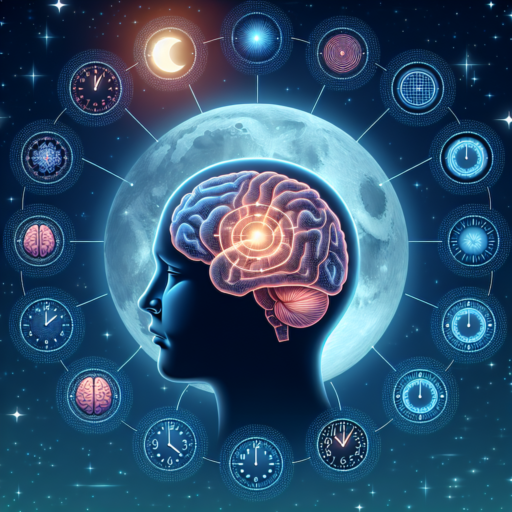Understanding Deep Sleep: What is It?
Deep sleep plays a pivotal role in our health and well-being, acting as a cornerstone component of the sleep cycle. But, what exactly is deep sleep? Medically known as NREM (Non-Rapid Eye Movement) Stage 3 sleep, it is the period during which the body reaches its most profound levels of relaxation and disconnection from the external environment. This phase is crucial for physical restoration, memory consolidation, and the strengthening of the immune system.
During deep sleep, the body undergoes significant physiological changes. Heart rates and breathing slow to their lowest levels, muscles relax, and brain waves slow down dramatically—a state known as delta wave or slow-wave sleep. It’s during this stage that the body focuses on repairing tissues, building bone and muscle, and bolstering the immune system. Interestingly, it’s also when hormones such as growth hormone are released, which play vital roles in growth and development.
The amount of deep sleep an individual requires can vary, but it remains an essential element of the sleep cycle. Adults typically spend about 13-23% of their sleep in this profound state. However, the percentage can decrease with age, highlighting the importance of maintaining healthy sleep habits to ensure sufficient deep sleep. Without enough deep sleep, one might not only feel tired but also have impaired memory, weakened immunity, and increased stress levels.
The Importance of Deep Sleep for Health and Wellbeing
Deep sleep, or slow-wave sleep, plays a pivotal role in the restoration and rejuvenation of the body and mind, marking its importance for both health and wellbeing. During this phase of sleep, the body enters a state of healing, where tissue repair and growth take place. It is a critical period when the body consolidates memories and experiences, turning short-term memories into long-term ones, facilitating learning and brain development. Therefore, securing an adequate amount of deep sleep is essential for maintaining cognitive function and emotional health.
Moreover, the influence of deep sleep extends beyond cognitive restoration. It significantly impacts physical health by regulating metabolic functions and maintaining a healthy balance of hormones. During deep sleep, the body releases growth hormone, which helps in muscle development and fat metabolism, aiding in weight management and physical fitness. Furthermore, it plays a crucial role in strengthening the immune system, as the production of certain white blood cells is optimized during this stage, enhancing the body’s defense mechanism against infections and diseases.
Beyond its physiological benefits, deep sleep also contributes to emotional wellbeing and mental health. It helps in moderating stress and anxiety levels, as deep sleep phases are linked to the reduction of cortisol, the stress hormone. Effective management of stress and anxiety through deep sleep can lead to an improved mood, better productivity, and an overall sense of wellbeing. This underscores the integral relationship between the quality of deep sleep and one’s psychological health, highlighting its necessity in the pursuit of a balanced and fulfilling life.
How Many Hours of Deep Sleep Do Adults Need?
Understanding the amount of deep sleep adults require is crucial for maintaining not just physical health, but mental well-being and overall vitality. Deep sleep, also known as slow-wave sleep, is a critical period during which the body undergoes repair and regeneration. For adults, navigating the complexities of sleep stages can often lead to confusion about just how many hours of deep sleep are necessary to reap the aforementioned benefits.
Experts in sleep science have provided guidelines to help individuals gauge their need for deep sleep. Generally, adults should aim for approximately 1 to 2 hours of deep sleep per night, which constitutes about 20% to 25% of total sleep duration. This benchmark can vary depending on various factors, including age, lifestyle, and overall health. It’s important to note that achieving sufficient deep sleep is integral for cognitive functioning, emotional regulation, and physical health.
The quest for enough deep sleep starts with understanding its significance and recognizing the indicators of quality sleep. Tools such as sleep trackers and smartwatches can offer insights into sleep patterns, including the amount of time spent in each sleep stage. However, emphasizing a holistic approach that includes regular sleep schedules, a conducive sleeping environment, and minimizing sleep disturbances can more effectively ensure the necessary deep sleep duration. Listening to your body’s needs and adjusting your sleep habits accordingly plays a pivotal role in achieving the ideal amount of deep sleep.
Factors That Influence Your Deep Sleep Requirements
Understanding the elements that dictate how much deep sleep you need is crucial for optimizing your health and well-being. Several key factors play a role, from your daily routines to your physiological makeup. By acknowledging these aspects, you can take appropriate steps to improve your sleep quality.
Age: A Determining Factor
Age significantly influences your sleep patterns, particularly deep sleep. As you get older, the amount of deep sleep you experience typically decreases. This is why babies need more deep sleep to support their developmental needs, whereas adults might find their deep sleep percentages declining as part of the natural aging process.
Lifestyle and Stress Levels
Your daily activities and stress levels have a profound impact on how much deep sleep you can get. Engaging in regular physical exercise can enhance the quality and quantity of deep sleep. Conversely, high stress can interfere with your ability to fall into deep sleep stages, highlighting the importance of stress management techniques in promoting better sleep.
Health Conditions
Various health issues, from sleep disorders like insomnia and sleep apnea to chronic conditions such as diabetes and heart disease, can affect how much deep sleep you get. Addressing these health concerns with medical guidance is essential for improving sleep quality and ensuring you meet your deep sleep requirements.
Signs You’re Not Getting Enough Deep Sleep
In the realm of good health and wellness, the importance of deep sleep cannot be understated. However, in our fast-paced world, countless individuals are finding themselves deprived of this crucial restorative sleep cycle. Recognizing the signs of insufficient deep sleep is the first step towards making a change for the better.
Constant Fatigue and Daytime Sleepiness
One of the most immediate signs that you may not be getting enough deep sleep is a persistent feeling of fatigue and drowsiness during the day. Even after clocking in eight hours of sleep, if you still find yourself reaching for that extra cup of coffee or longing for a nap, it might be an indication that your sleep quality is compromised. It is during deep sleep that the body undergoes vital repair and recovery processes; without it, you’re likely to feel physically and mentally exhausted, no matter how long you spend in bed.
Difficulty Concentrating and Memory Issues
Another sign of inadequate deep sleep is experiencing difficulty with concentration and memory. Deep sleep plays a cardinal role in cognitive function, including memory consolidation and processing of new information. When deprived of enough deep sleep, you may notice it’s harder to focus or remember details. This cognitive fog can affect all areas of your life, from work performance to everyday tasks.
Feeling Moody and Irritable
Lack of quality deep sleep doesn’t just affect your physical and cognitive well-being; it also takes a toll on your emotions. Individuals not getting sufficient deep sleep often report feelings of irritability, moodiness, and even an inclination towards depression or anxiety. The emotional regulation is closely tied to sleep quality, hence the more disrupted your sleep, the more extreme your mood swings might be.
Recognizing these signs can help you take the necessary steps to improve your sleep hygiene and ensure you’re getting the restorative deep sleep your body and mind require.
No se han encontrado productos.
Proven Strategies to Increase Deep Sleep
Deep sleep is crucial for overall health and well-being, playing a critical role in memory consolidation, physical healing, and emotional balance. Enhancing the quality of deep sleep can lead to improved energy levels, better mood regulation, and increased cognitive function. Fortunately, there are proven strategies that can significantly increase the quantity and quality of your deep sleep.
Maintain a Regular Sleep Schedule
One of the most effective methods to encourage deeper sleep is adhering to a consistent sleep schedule. Going to bed and waking up at the same time every day, including weekends, helps regulate your body’s internal clock. This consistency can significantly improve the quality of deep sleep phases over time, making it easier to fall asleep and stay asleep throughout the night.
Optimize Your Sleep Environment
Creating a sleep-conducive environment is pivotal for enhancing deep sleep. This includes maintaining a cool, dark, and quiet bedroom. A temperature around 65°F (18.3°C) is ideal for promoting sleep, as it helps decrease the body’s core temperature, a signal to the brain that it’s time to sleep. Additionally, eliminating noise and light exposure can further assist in improving the quality of your sleep by reducing disturbances that may prevent the deep, restorative stages of sleep.
Integrating these strategies into your nightly routine can make a significant difference in your sleep quality. While it may take some time to observe tangible improvements, the long-term benefits for your health and well-being are substantial. Engaging in these practices consistently is key to unlocking the rejuvenating power of deep sleep.
Role of Lifestyle in Achieving Optimal Deep Sleep Hours
The pursuit of achieving optimal deep sleep hours is not solely a nighttime affair; it reaches deep into the fabric of our daily lifestyle choices. From the diet we follow to the level of physical activity we engage in, each aspect plays a pivotal role in determining the quality and quantity of deep sleep we experience. In this segment, we delve into how various lifestyle modifications can enhance our journey towards achieving the coveted state of deep, restorative sleep.
Importance of Exercise
Regular physical activity is paramount for encouraging deep sleep. Engaging in at least 30 minutes of moderate exercise can significantly improve the quality of sleep. Activities such as walking, jogging, or yoga, especially when done in the morning or afternoon, can set the stage for a smoother transition into deep sleep phases. However, it’s crucial to avoid rigorous workouts close to bedtime as they can have the opposite effect and impair sleep quality.
Nutritional Habits and Their Impact
What we consume plays a crucial role in how well we sleep. Foods rich in magnesium, calcium, and tryptophan are known to enhance sleep quality. A well-balanced diet that limits high-sugar and high-fat foods, especially close to bedtime, can prevent disruptions in the sleep cycle. Incorporating warm milk, nuts, and cherries, which contain natural sleep-promoting compounds, into the evening diet can also aid in achieving deeper sleep hours.
Creating a Sleep-Conducive Environment
Our environment has a profound impact on sleep. A bedroom that cultivates relaxation and comfort is key to delving into deeper sleep phases. This includes maintaining a cool, dark, and quiet room. The use of heavy curtains, eye masks, and white noise machines can assist in creating an ideal sleep environment. Moreover, investing in a high-quality mattress and pillows can dramatically improve sleep quality and facilitate the journey into deep sleep.
Deep Sleep vs. REM Sleep: Knowing the Difference
Sure, let’s delve into the content structured for web with a focus on SEO optimization, keeping the given title in mind.
Understanding the distinction between deep sleep and REM (Rapid Eye Movement) sleep is crucial for comprehending how sleep cycles influence our health, mood, and overall wellbeing. While both phases are essential components of the sleep cycle, they serve different functions in the restorative process.
What is Deep Sleep?
Deep sleep, also known as slow-wave sleep, is the phase where the body enters into its most reparative and restorative state. During this stage, brain waves slow down considerably, muscle relaxation increases, and heart rate and blood pressure decrease. This period is critical for physical recovery, immune system fortification, and memory consolidation. Understanding the role of deep sleep can assist individuals in recognizing its effects on daily energy levels and long-term health.
What is REM Sleep?
In contrast, REM sleep is characterized by rapid eye movement, increased brain activity, and vivid dreams. This phase is essential for cognitive functions such as processing emotions, consolidating memories, and learning. During REM sleep, the body essentially becomes paralyzed, preventing one from acting out dreams. It’s during this stage that the brain performs critical tasks related to mental health and memory reinforcement.
- Deep Sleep: Critical for physical recovery and memory consolidation.
- REM Sleep: Crucial for emotional processing and cognitive functions.
Monitoring Your Sleep: Tools and Technologies
Sleep is a critical component of our overall health, and with the advancement in technology, monitoring our sleep patterns has become more accessible and insightful. There are a variety of tools and technologies designed specifically to help us understand and improve the quality of our sleep. From wearable devices to applications, each offers a unique insight into our nightly rest.
Wearable Sleep Trackers
One of the most popular methods for monitoring sleep involves wearable devices, such as smartwatches and fitness bands. These gadgets are equipped with sensors that track your movements and heart rate throughout the night, providing a comprehensive overview of your sleep cycles, including REM and deep sleep phases. Many wearables also offer features like silent alarms to wake you gently during the lightest phase of your sleep, aiming to improve how refreshed you feel in the morning.
Smart Mattresses and Pillows
Beyond wearables, the market has expanded to include smart mattresses and pillows. These innovative sleep surfaces are embedded with technology that monitors your sleep quality, tracks your heart rate, and even detects snoring. Some models can adjust their firmness based on your sleeping position or heat up to encourage relaxation. By providing data directly related to your sleeping environment, smart mattresses and pillows offer personalized feedback to help enhance your sleep experience.
In the realm of sleep technology, there is no one-size-fits-all solution. The key is finding the tool or technology that aligns with your specific needs and preferences. Whether it’s a sophisticated wearable device or a smart bed that adjusts to your body, these technologies can provide valuable insights into your sleep patterns, helping you to make informed decisions about your sleep health.
When to See a Doctor About Your Sleep Habits
Sleep plays a crucial role in our overall health, yet many of us struggle with various sleep issues at some point in our lives. Knowing when to see a doctor about your sleep habits is essential for addressing potential sleep disorders and improving your quality of life. While occasional sleep disturbances are common, persistent problems can have a profound impact on your physical health, emotional well-being, and daily performance.
It’s advisable to consult a healthcare professional if you experience consistent difficulty falling or staying asleep, if you often wake up feeling unrefreshed, or if sleep issues interfere with your daily activities. These could be signs of a sleep disorder such as insomnia, sleep apnea, or restless legs syndrome. Furthermore, if you find yourself relying on sleeping pills or alcohol to fall asleep, it’s a clear indication that it’s time to seek medical advice.
Additionally, if your sleep disturbances are accompanied by symptoms like snoring loudly
, experiencing long pauses in breathing during sleep, undergoing significant mood swings, or having difficulties with concentration and memory, these could be red flags signaling a more serious condition. Early diagnosis and treatment are key to managing these issues effectively, improving your sleep, and enhancing your overall health.




